“Ewww ewww that smell? Can’t ya smell that smell?”
Lynyrd Skynyrd, with apologies
Let’s hope not. I’m no stranger to odors. I (Michael, guest author) live full-time in my travel trailer with my wife, four rambunctious children, and our boxer Petty (named after Tom Petty, of course).
Why does your RV smell? You can usually trace odors in a camper to these sources:
- A dirty gray water tank with dry P-trap
- A dry toilet seal above black water tank
- Propane leaks
- A forgotten trash can
- Your 2-year-old’s diaper
Other possibilities include:
- A faulty air admittance valve (AAV)
- Worn-out water heater anode
- Ammonia leak from a broken refrigerator
- Clogged tank vent pipes
- Rodent or insect infestations
I have to warn you: I’m going to cram a crapload of potty humor into this article. My kids are 11 and under. Potty humor is a way of life for us. Downsizing from 1,700 square feet down to 150 forced us to make “finger pulling” an outside activity.
Why Does My RV Smell Like Rotten Eggs?
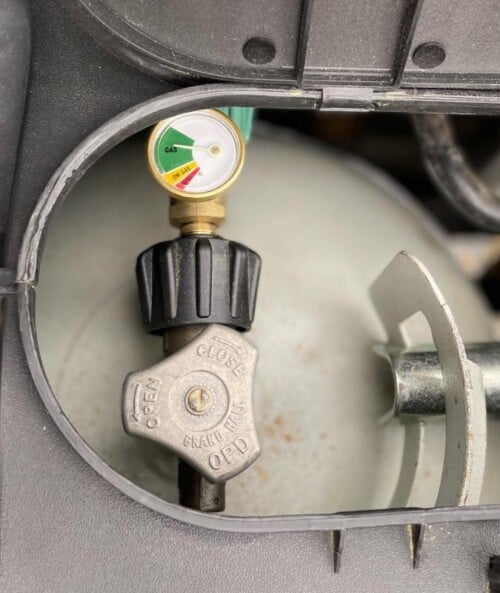
If you aren’t already, familiarize yourself with the smell of propane and how to shut it off on your rig. My kids have “accidentally” turned on the stovetop a few times already. In fact, a leaky stove is probably the most common source of a propane leak!
Some RVs have individual LP shut-off valves for each appliance. These are installed in the main copper, black iron or flexible rubber supply lines. Other systems only have the main shut-off valve on the tank itself. Know where your tanks are located, and know how to turn them off safely!
You can use a soapy water or bubble leak detection fluid to spray around joints and connections to check for leaks. You’ll see excess bubbling anywhere there’s a leak.
Thankfully, I learned the dangers of propane from changing hundreds of tanks in my former career and from ‘90s action movies. Propane itself is odorless, but refiners add mercaptan, which smells like rotten eggs, to alert your nose to leaks.
Your rig should have an LP detector mounted near the floor to find propane leaks. Make sure the LP detector is working! Check it every year.
Why Do My RV Tanks Smell?
Gray Water Tank Smells
A lot of RVers assume stink automatically comes from the black water (aka waste) tank, but the truth is, the gray water tank is the more likely stank culprit.
It’s the same reason your kitchen fridge handle is probably dirtier than your toilet: Your toilet gets cleaned more.
Dry or Faulty Trap
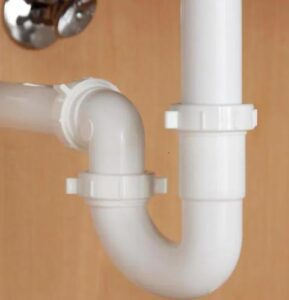
Your sink and shower should have P traps (wet) or Hepvo valves (dry waterless) underneath the drains. These valves block the tank odors from rising into the interior living space.
However, if a P trap dries up or the water sloshes out – both common occurrences after long-term storage or rough roads – it won’t work. Similarly, the baffles in a waterless valve can “stick” and stop working. You’ll discover the problem pretty quickly!
Here’s how to fix the problem.
- A dry P trap just needs water poured down the drain.
- A broken waterless valve should be replaced.
- Use drain stoppers to prevent water from sloshing out.
Broken Air Admittance Valve
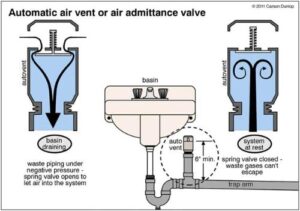
You’ll commonly find Air Admittance Valves (AAV) downstream of the P trap on a kitchen or bathroom sink. When the internal diaphragm stops working, odors can escape into the living space, bypassing the P-trap.
Again, the solution is simple. Buy a new one to replace the old one. But you might need the help of an RV service technician to properly diagnose the problem.
Black Water Tank Smells
Dry Toilet Seal
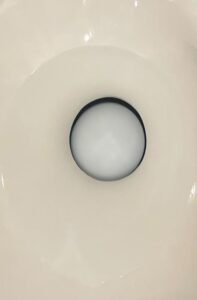
If your rig has the typical RV gravity toilet – learn all about them here! – then the toilet itself doesn’t do the air-sealing. You’re supposed to have about an inch of water in the bottom of the toilet bowl at all times. This is similar to the water in a P trap.
If you have a broken or leaky toilet seal, then the bowl won’t hold water. You can prevent leaky toilet seals by following the manufacturer’s instructions for cleaning chemicals, no abrasive brushes, etc.
If the seal is truly broken, again, the solution is to buy new and replace old. And to hedge your bets, why not purchase a battery-powered air freshener while you’re at it?
Clogged Black Tank
If you are keeping enough water in your black tank, doing black tank flushes and treating your tanks, then they really shouldn’t smell.
Otherwise, you’ll get clogs. This blockage results in odors and they have to go somewhere. Time to investigate.
You need to clean out your RV black tank. Some RVers swear by liquid fabric softener as an air freshener. Dump a ¼-cup or so down the toilet, they say. I’ve never tried it, myself.
Other RVers use bleach. As we’ve discussed elsewhere, bleach can kill the enzymes and microbes responsible for decomposing waste, so you only want to use bleach as a last resort.
Dry Black Tank
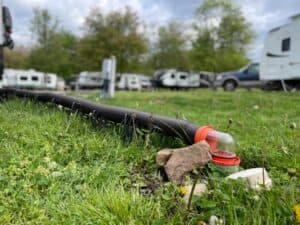
Don’t leave the black tank valve open! This sounds like an Uncle Eddie move. The only time this valve should be open is when dumping the black tank or cleaning the black tank. Here’s our article about even more great tips for dumping your tanks.
Leaving your black tank valve open allows water to drain from your black tank. Solids will pile up and harden. Congrats! You’ve created your very own s**t stalagmite or poop pyramid.
(This next observation comes from my wife). With a 24/7 open sewer, you are basically opening a portal to the RV waste of your neighbors and those before them. Things can crawl up from beyond and come up through your toilet.
I’m pretty sure this one isn’t true, but I’m not rolling the dice.
Is the Smell Coming from a Clogged Vent Pipe?
A clogged or dysfunctional vent pipe won’t allow stink to escape from your RV holding tanks.
In 99% of RVs, the main vent[s] protrude from the roof as a 2-inch pipe. Examine the pipe. Make sure it’s clean and clear of any debris.
In other cases, the vent may exit high up on the sidewall. Again, clean out any debris.
If your RV doesn’t already have one, you owe it to yourself to get a Lippert 360 Siphon or Camco Cyclone roof vent cap. These nifty devices draw massive amounts of air through the vent system, helping to break down waste faster and eliminate odors. You might even be able to eliminate your tank treatment routine!
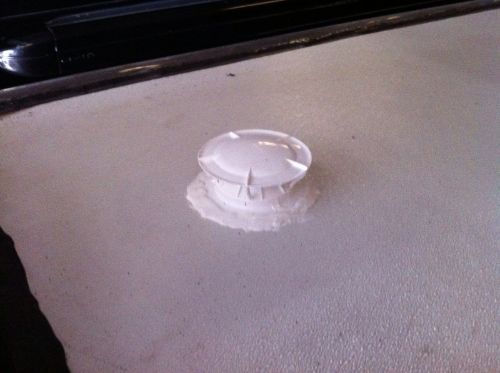
5 Tips for Getting Rid of RV Tank Odors
Poo-Pourri
If I was building a gift basket for someone getting their first RV, this would definitely be in there. Their marketing is hilarious and the name just makes you giggle. Poo-Pourri masks the smell of your #2 (yes, it really works). Instructions: “Shake well, spritz 3-5 sprays into the toilet bowl onto the water’s surface. Proceed to use the throne as usual.”
Clean the Gray Tank
Don’t forget to treat your gray tank as well. Food will inevitably make its way down the drain. If this food fails to make its way out of your RV it can cause quite an odor. Is it possible that rotten egg salad smells worse than fresh egg salad?
Cook Outside
Between the residual smells from cooking and the steam of the InstaPot, it makes sense for us to cook most of our meals outside. I love the smell of bacon as much as the next guy, but I’m not cooking it inside my RV. (Ross, my co-author, disagrees, and would happily cook bacon inside a solitary confinement cell).
Confession: I, Michael, also enjoy the smell of skunk – but only from a distance.
Keep Your RV Dry
Unlike the black tanks, water is not your friend inside the RV. Moldy and musty smells can result in RVs due to water leaks, kids throwing wet clothes in the laundry pile (most common cause in our abode), and excessive humidity. Crack that window open!
I, Ross, wrote an online Ebook about RV indoor air quality here. I teach you how to take care of moldy and mildewy smells. Check it out.
Hydrate Your Tanks!
Always add some water to your black and gray tanks when you set up camp and right after you empty your tanks. My best advice for dealing with RV odors is to defend against them.
- Keep plenty of fluids in your gray and black tank
- Treat your tanks on a regular basis
- Don’t let solid food items go into your gray tank
What About Those Other RV Odors?
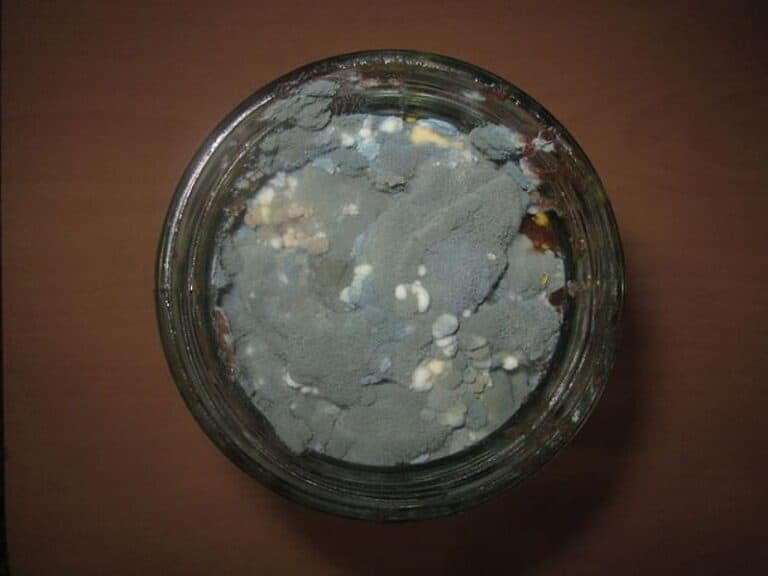
Is An Old Water Heater the Culprit?
Usually, the “rotten egg smell” indicates a propane leak or dirty gray water tank. However, in some cases, it can come from your actual water! Ew, gross, right?
Your water can be contaminated from sulfates in your water heater if your anode rode breaks or disintegrates. Not all water heaters have anodes. Most aluminum-bodied tanks, for instance, don’t. But if your water heater has an anode, you need to make sure it’s working properly. They do wear out.
Geez, What’s In This Water?
While rare, your water itself may be the culprit. Contaminated water can reek. Underground pipe leaks in old campgrounds can lead to contaminated water delivery. For that reason – and many others – I recommend you always use a water filter at a campground.
Or what if you stored your RV over the winter without cleaning out the fresh water tank? Congratulations! You’ve grown an entire microcosm of bacteria inside your tank! Unfortunately, now your water is unpotable. Clean out that tank!
Keep the Mice Out!
We had our first encounter with a mouse not too long ago. Thankfully we caught it quickly. Some dear friends lost their entire camper to a mouse infestation over the winter months.
Be on the lookout for any potential activity and sure up any points of entry. The smell that their waste can leave in your RV will be burned in your nostrils forever.
A mouse can get through a hole smaller than ⅜-inch, about the size of a Sharpie pen. Devious little creatures, they are. Common entry points are through the floor of your unit around unsealed drain lines, LP hoses, etc.
Mice can climb up your tire sidewalls, electric cord, sewer hose and tongue jack. You can’t keep them from accessing the outside; just make sure they can’t wriggle their way inside.
Get Rid of the Roaches
I spent many years in the cable industry. We would receive equipment back from customers that was infested with cockroaches. It is a putrid smell that I’d rather not experience again.
You must defend your territory from these pests. I’ve added screens in several key areas, such as the refrigerator and furnace vents, set ant traps and used spray foam to seal up potential points of entry.
Eliminate the Ammonia
If you’ve never smelled ammonia, it sort of smells like concentrated cat urine. It’s used in every propane-powered RV fridge. If you see yellow stains on the floor, that’s another indicator of ammonia on the loose!
Leaking ammonia is a fatal flaw in your reefer’s cooling unit, accessible only from the back of the fridge. You can ask an RV service technician to either attempt to fix the cooling unit, repair the unit, or replace the entire fridge. Get quotes for all three options.
As we venture across the country we’ve taken in the smells of campfires, Hershey Pennsylvania’s Chocolate World, grilled meats and spring rains. These pleasant aromas serve as another reminder of how fortunate I am to be living this lifestyle. We’ve been able to avoid the smells that make you run screaming out of your RV.

Co-Author Michael Huff: Full-time RVer, husband, father, son, brother, friend and dreamer. I am officially “living the dream:” traveling the country with my amazing wife, four awesome kids, and beloved boxer in our 150-sf RV. Each day we are learning, laughing, (maybe a little yelling) and finding the good in this world.
Leave a Reply